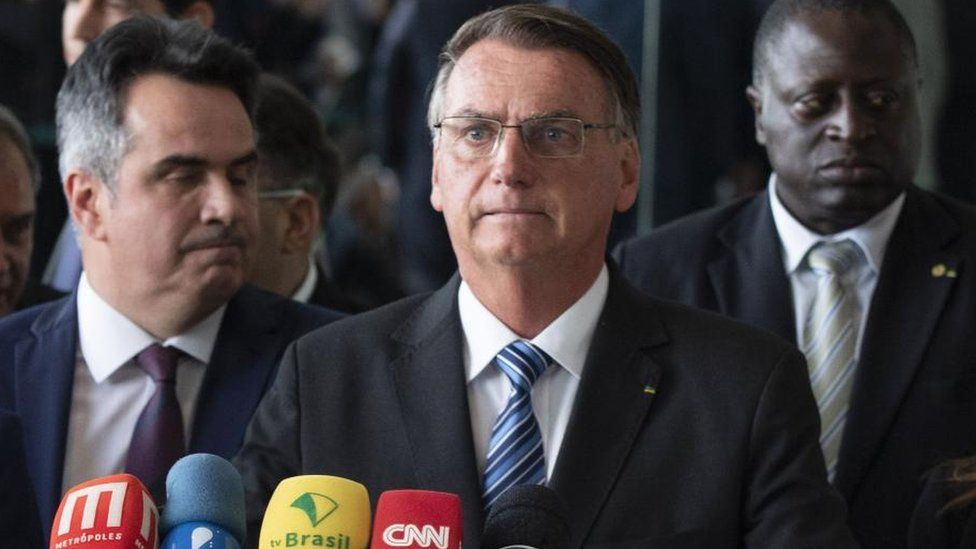Brazil’s far-right president, Jair Bolsonaro, has broken the silence he had maintained since being defeated in Sunday’s presidential election.
He thanked voters who had cast their ballots for him but did not acknowledge defeat.
But he did not contest the result either, as some had feared he would.
His chief of staff, Ciro Nogueira, spoke after Mr Bolsonaro’s brief statement saying that the “process of transition” of power would begin.
Even though Mr Bolsonaro did not himself acknowledge defeat in his own words, Brazil’s Supreme Court released a statement shortly after his speech saying that by authorising the transition of power, he had recognised the result of the election.
Combative statements from the president in the past – such as that “only God” could remove him from office – meant that there had been a tense wait for him to appear in public.
Before the election, he had also repeatedly cast unfounded doubts on the voting system.
When he finally appeared in public, 44 hours after the election result was announced, Mr Bolsonaro’s statement lasted only two minutes and he did not take any questions from the assembled reporters.
In the message aimed at his supporters, Mr Bolsonaro said that “our dreams continue as alive as ever”.
He repeated the values he says he and his party stand for – “God, fatherland, family and freedom” – and insisted that he would continue to strive for “order and progress”, the words emblazoned on Brazil’s flag.
He did not mention Luiz Inácio Lula da Silva, his arch rival who narrowly beat him on Sunday, at all. In a break with tradition, Mr Bolsonaro has still not called the man who defeated him in the election.
Hardcore supporters of Mr Bolsonaro – who refuse to accept that he lost – have erected hundreds of roadblocks in all but two states of Brazil.
In his speech, Mr Bolsonaro referred to them as “current popular movements” and said they were “the fruit of indignation and a sense of injustice of how the electoral process unfolded”.
He added that “peaceful demonstrations” would always be welcome, but that “our methods can’t be the same as those used by the left, which always harmed the population, such as invasion of lands, disrespecting property and impeding the right to come and go”.
The head of Brazil’s Supreme Court, Alexandre de Moraes, had said earlier on Tuesday that the roadblocks posed “a risk to national security” and ordered that them to be cleared.
But police have struggled to remove all of them, with more than 250 still in place.
The blockages are causing considerable disruption and affecting food supply chains.
They started shortly after Brazil’s electoral authorities announced a narrow win for Lula in the run-off of the presidential election. With all the votes counted, Lula had 50.9% of the valid votes against Mr Bolsonaro’s 49.1%.
Congratulations immediately started pouring in for Lula from across the world, with US President Biden saying the win came “following free, fair and credible elections”.
Mr Bolsonaro, who is normally a keen user of social media, stayed silent and out of the public eye. But he started to look more and more isolated as even his close allies congratulated Lula.
The powerful speaker of the lower house of Congress, Arthur Lira, sent a strong message when he said that “the will of the majority, as it is expressed in the polls, can never be contested”.
But some supporters of Bolsonaro appeared emboldened by his silence.
“We will not accept losing what we have gained, we want what is written on our flag, ‘order and progress’,” one protester in Rio de Janeiro told AFP news agency. “We will not accept the situation as it is,” the man added.
Source: BBC News


